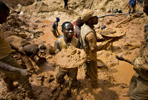
A BBC team in eastern Congo produced this stellar article, “From rebel-held Congo to beer can,” and podcast "Illegal Mining in Congo," both of which feature the perspectives of several key actors in eastern Congo’s profitable—and deadly—minerals trade. From an artisanal digger in a tin mine in South Kivu:
We have to pay the rebels to work here…They force us to give them cash or the equivalent in minerals, he added, standing on the edge of his three-meter deep pit.
And this (very likely false) statement from a colonel in the FLDR, a Rwandan Hutu militia responsible for some of worst human rights abuses in eastern Congo in recent years. (Yesterday, Human Rights Watch issued a statement documenting the FDLR’s latest atrocities, including rapes of women and girls in North and South Kivu during the recently concluded joint Rwandan-Congo military operation against the FDLR.) Here’s what the colonel had to say:
It is the Congolese administration which is in charge of the mines in this region. We mainly live off farming. We raise cattle and trade at local markets.
The BBC reporters also spoke to Congolese people living in a village near a tin mine, who allegedly affirmed that the FDLR rebels controlled the mines in the area:
We are like lambs facing wolves, one villager said. We feel in danger from these rebels all the time. The international community should really take on the issue, and make them return to Rwanda.
Finally, the BBC also spoke with a local businessman and asked if the export houses in regional capitals such as Bukavu and Goma knew the precise location where the minerals they purchase are mined, and therefore whether or not they were implicit in the illegal activities of the FDLR and other armed groups active in the illicit minerals trade. The businessman said:
We buy minerals from traders, so we can tell which market or company they’re coming from – but we can’t tell the exact mine…
The article then noted that later in the conversation, the businessman drifted from his typical line:
Look, he said, in a rather tired and impatient way. What can we do to chase them? We suffer from their presence as well. They rape our women, and people are leaving the bush because of them, taking refuge in town. How can we get the weapons to fight them? We have none.
Actually, what is more interesting about the reporters’ conversation with this businessman is what he didn’t say:
He refused to answer whether these sorts of abuses by the rebels might be stopped if the members of his business association stopped paying out money which might end up in the hands of the FDLR.
These quotes are illustrative of the need for a comprehensive approach to the illicit minerals trade in eastern Congo. Stay tuned for a new strategy paper from Enough on what this approach should entail, and sign our Conflict Minerals pledge to encourage your electronics companies to investigate whether or not their products are fueling the deadliest conflict in the world since World War II.
Photo of gold mining in eastern Congo: Finbarr O’Reilly/Reuters

